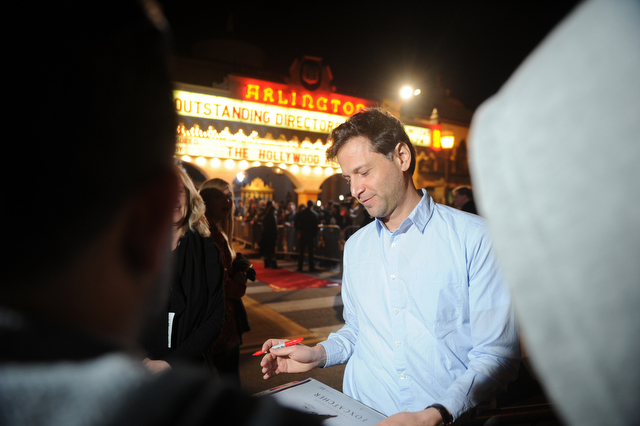Directors’ Voices in the Zen Garden
SBIFF’s First Outstanding Directors of the Year Event

Given the award-winning company on stage and the reputation of the SBIFF Director’s Panel host, it was downright amazing that the O-word was never invoked last night. All of the films and most of the directors have been nominated for Academy Awards, after all.
The honorees at this first-ever event — it used to be just a panel at the Lobero without awards — included brilliant newcomer Damien (Whiplash) Chazelle, veteran and handicapped Academy favorite Richard (Boyhood) Linklater (who virtually invented the American indie art film); Bennett Miller, the film classicist who directed Foxcatcher; Laura Poitras the documentary-maker behind Citizen Four, and the Danish newcomer Morton Tyldum of Imitation Game fame. Our host for the evening was Scott Feinberg, widely-known as an “oscarcologist,” according to his lavish introduction by board prez Jeff Barbakow. But Feinberg wisely avoided the Oscar race, the better to investigate the widely-varied panel without creating a brawl, though the evening tended to run aground on encouraging words and platitudes.
The articulate Chazelle, barely out of his 30s, revealed his own drumming past as a prelude to the monstrous and beautiful Whiplash. “To my complete surprise, no one wanted to make a film about a sadistic band leader,” he laughed, but went on to describe his own claim to mad ambitions. “I live in L.A., a place that moves very slow,” he said. “Everybody talks about making movies all the time, but they never do it.” He imposed crazy deadlines on himself and made a masterpiece. Sadly, Feinberg seemed more interested in Chazelle’s life in the limelight, rather than his directorial yarns.
Linklater revealed his preference for life over narrative, even though he calls himself a storyteller. He likes his movies to feel real, explaining, “Life doesn’t have a lot of plot.”
Miller, who seemed a little lost in his own head while speaking, was the evening’s most fascinating subject. He likes eccentrics, he confessed, because he likes stories “that convey the quality of a particular consciousness” — something like you see in Hitchcock, Kubrick, and Sidney Lumet’s The Pawnbroker. He also enjoys working with comedians because they have a public face, “but they also have another side that is very guarded.” His most intriguing moment was a comparison between his films and Zen gardens. Remarkably, he made the metaphor sound not like New Age drivel.
Feinberg seemed most comfortable talking with Poitras, whose firsthand interview documentary with Edward Snowden still hasn’t gotten the widespread recognition it deserves outside of dumb controversies. Motivated by the “moral vacuum” that seemed to fill in American life after 9/11, Poitras chronicled her life as a “visual journalist” and, apparently, a person suspect to American intelligence services.
Morten Tyldum, an outsider to American filmmaking, spoke about being “fascinated, intrigued and outraged,” by the story of Alan Turing. He also seemed blissfully happy just to be on a stage winning praise for The Imitation Game.
All of the directors seemed most happy just hanging with all of the directors. “This is much better than a beauty contest,” said Bennett. It was a group of artists who illustrate the importance of directing with individual voices, said Poitras, “And this was a very good year for that.”



